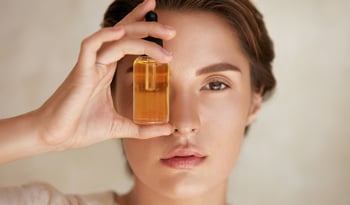Buzzworthy Skincare Ingredient: Beta Glucan
DESCARGO DE RESPONSABILIDAD:Este blog no pretende proporcionar diagnóstico...
- En este artículo:
- What Are Beta Glucans?
- How Do Beta Glucans Affect the Skin?
- Recommended Beta Glucan Products

If you’re tuned into the skincare world, you may have heard about the popular ingredient beta glucan (B-glucan). In this article, I’ll break down what it is, why it’s used in skincare products, and which products to look out for.
What Are Beta Glucans?
Beta glucans are polysaccharides, which means they are molecules made up of multiple sugar building blocks. In nature, polysaccharides are generally considered to be structural and storage molecules. For example, in plants, sugars are stored as the polysaccharide called “starch,” whereas in humans, sugars are stored as the polysaccharide called “glycogen.” In plants, fungi, and arthropods, polysaccharides such as cellulose or chitin make up the structure of the cell walls or exoskeletons.
Beta glucans refer to specific types of polysaccharides which can be found in cereals (like oats, barley, and other grains), fungi, yeasts, and seaweed, among other things. When we eat plants and grains that contain beta glucans, they are a source of dietary fiber.
When taken orally, beta glucans have shown some evidence that they can help lower cholesterol, which may help reduce the risk of heart disease. There are a number of other possible reported benefits for oral beta glucans, but the science to fully support those claims is still not very strong.
How Do Beta Glucans Affect the Skin?
In the world of cosmetics and skincare, beta glucans have attracted a lot of interest due to their properties in improving skin health.
Beta Glucans and Skin Hydration
Perhaps the most well-known feature of beta glucans is their role in skin moisturization. For example, there was a 6-week randomized, double-blind, placebo-controlled study on 13 people with sensitive skin who applied a beta glucan formulation twice a day. The researchers concluded that the skin’s ability to retain moisture was increased and the loss of water from the skin (transepidermal water loss) was decreased in the people who used the beta glucan application, leading to overall improved skin hydration. In addition, there also was a 16-week randomized, double-blind, placebo-controlled study of 20 men in which the beta glucan formulation was applied twice daily and lead to significant improvement in skin roughness and hydration. One recent study even looked at a beta glucan formulation that was applied to one side of the face after cosmetic laser treatment in 20 patients. In that study, the side that was treated with the beta glucan product was better hydrated, with lower levels of transepidermal water loss.
These research findings suggest a role for beta glucans in maintaining skin hydration, and because of their ability to help hydrate the skin, beta glucans may minimize the appearance of fine lines and wrinkles. This is because when the skin is well-hydrated, the skin is more plump and healthy, making wrinkles a little less noticeable. Who wouldn’t want that?!
Beta Glucans and Skin Conditions
Because of the hydration and immune-boosting capabilities of beta glucans in skincare products, beta glucans have also been researched in people with sensitive, dry skin conditions such as atopic dermatitis. For example, in one study of 80 people with atopic dermatitis, a beta glucan formulation was applied to one side of the body, and that side had fewer skin “flares.” Another study on rats with atopic dermatitis tested an oral beta glucan product combined with a probiotic. The researchers found lower levels of itch and inflammation in the rats who received the beta glucan formulation.
As a dermatologist, I would probably want to see more evidence that beta glucan works for atopic dermatitis before I could start regularly recommending it as part of a treatment plan, but it definitely seems like there could be some possible benefit, and it is worth learning more about. One of the main things I would caution about regarding the use of topical beta glucans for people who have sensitive skin or atopic dermatitis is that a lot of the commercial skincare products with beta glucan also contain a number of other preservatives, fragrances, and botanical ingredients, which can sometimes cause irritation and allergies, especially in people who are prone to such reactions.
In addition to their role in skin hydration, there are also a number of studies that have shown beta glucans to be beneficial in speeding up wound healing. Although beta glucan isn’t routinely used as a standard wound care treatment in the medical profession, it has been demonstrated to have beneficial effects on wound healing not only in the lab, but also in mice, rats, fish, and humans! Maybe we will see more of it as a part of wound care in the years to come.
Recommended Beta Glucan Products
Now that you’ve learned what the beta glucan ingredient is, and what the potential benefits are for the skin, you may be interested in incorporating beta glucan into your skincare routine. But how?
To create a dermatologist-approved skincare routine, I always say that three main components should be included as part of a solid foundation for a skincare regimen: 1) A gentle cleanser, 2) Sunscreen with at least SPF 30 or higher, and 3) Moisturization and skin barrier support. Beta glucan as an ingredient falls into the moisturization step of the skincare routine, so I would look for it in products that are marketed as “hydrating” or “moisturizing.” The moisturizing step usually comes at the end of the skincare routine, and is most effective when applied to damp skin, morning and night.
Here are some of the beta glucan skincare products that I think are most compelling:
iUNIK Beta-Glucan Daily Moisture Cream
iUNIK Beta-Glucan Power Moisture Serum
Petitfee B-Glucan Deep Firming Eye Mask
Real Barrier Intense Moisture Cream
Real Barrier Extreme Essence Toner
Missha Time Revolution Red Algae Revitalizing Serum
Note: This blog is not intended to provide diagnosis, treatment, or medical advice. Content provided on this blog is for informational purposes only. Please consult with a physician or other healthcare professional regarding any medical or health-related diagnosis or treatment options. Information on this blog should not be considered as a substitute for advice from a healthcare professional. The claims made about specific products throughout this blog are not approved to diagnose, treat, cure, or prevent disease.

 Por Dra. Afton (Chavez) Cobb, doctora en medicina, Miembro de la Academia Americana de Dermatología
Por Dra. Afton (Chavez) Cobb, doctora en medicina, Miembro de la Academia Americana de Dermatología










